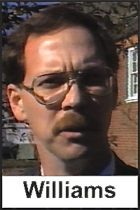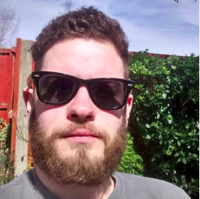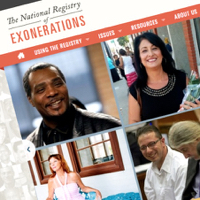Rascals case in brief
In the beginning, in 1989, more than 90 children at the Little Rascals Day Care Center in Edenton, North Carolina, accused a total of 20 adults with 429 instances of sexual abuse over a three-year period. It may have all begun with one parent’s complaint about punishment given her child.
Among the alleged perpetrators: the sheriff and mayor. But prosecutors would charge only Robin Byrum, Darlene Harris, Elizabeth “Betsy” Kelly, Robert “Bob” Kelly, Willard Scott Privott, Shelley Stone and Dawn Wilson – the Edenton 7.
Along with sodomy and beatings, allegations included a baby killed with a handgun, a child being hung upside down from a tree and being set on fire and countless other fantastic incidents involving spaceships, hot air balloons, pirate ships and trained sharks.
By the time prosecutors dropped the last charges in 1997, Little Rascals had become North Carolina’s longest and most costly criminal trial. Prosecutors kept defendants jailed in hopes at least one would turn against their supposed co-conspirators. Remarkably, none did. Another shameful record: Five defendants had to wait longer to face their accusers in court than anyone else in North Carolina history.
Between 1991 and 1997, Ofra Bikel produced three extraordinary episodes on the Little Rascals case for the PBS series “Frontline.” Although “Innocence Lost” did not deter prosecutors, it exposed their tactics and fostered nationwide skepticism and dismay.
With each passing year, the absurdity of the Little Rascals charges has become more obvious. But no admission of error has ever come from prosecutors, police, interviewers or parents. This site is devoted to the issues raised by this case.
On Facebook
Click for earlier Facebook posts archived on this site
Click to go to
Today’s random selection from the Little Rascals Day Care archives….
Click for earlier Facebook posts archived on this site
Click to go to
Today’s random selection from the Little Rascals Day Care archives….
‘If he made such a statement, it was not a threat’ (!)
 Aug. 3, 2012
Aug. 3, 2012
“Betty Ann Phillips, who had worked at the day care center, said (in the first episode of “Innocence Lost’) that she had complained to (District Attorney H.P.) Williams when she found out that indictments had been filed in her child’s name.
“She said Williams had advised her ‘not to go out on the street and say you’re unhappy with what we have done.’
“‘And then in the next sentence he said, “Because you know that all of the children are saying that you were the lookout while this was going on.”’
“In a telephone interview, Williams did not dispute that he had told Mrs. Phillips he had evidence from other children that she had acted as a lookout, but… if he made such a statement to her it was not meant as a threat.”
– The Associated Press, May 9, 1991
Who remembers wrongful conviction was overturned?

icenirising.wordpress.com
Keelan Balderson
March 3, 2016
“From the McMartin preschool trial in the United States in the ’80s … not one ‘satanic abuse’ network in the modern context has ever been proven to exist.
“Despite this fact people tend to remember the sensationalism of each case, and the fear and rumors generated by them. Not the final verdict, which has always been acquittal or at least the overturning of a wrongful conviction. The truth of each case gets lost in time….”
– From “Satanic Ritual Abuse: 7 Fictions That Created A Mythology” by Keelan Balderson at WideShut (March 8, 2015)
What might it feel like, all these years later, encountering people who vaguely remember your prosecution for “satanic ritual abuse” at Little Rascals – but not your exoneration?
![]()
Another bumper harvest for National Registry of Exonerations
 March 20, 2017
March 20, 2017
“America saw another record year for the number of prisoners being exonerated, according to the National Registry of Exonerations, a project of University of California Irvine Newkirk Center for Science & Society, University of Michigan Law School, and Michigan State University College of Law.
“For 2016, 166 people were exonerated of crimes and released from prison, 52 of them for murder. Of all the exonerations, 70 cases involved official misconduct of some sort, and in 74 of the cases, convictions came from guilty pleas. And in 94 cases (also a record) it turned out that no actual crime occurred at all. These were mostly drug cases but also some child sex abuse cases. Most famously, the San Antonio Four, four women convicted in 1998 in a fabricated satanic child sex abuse ring scandal, were released in 2016 after it finally became clear the crimes never occurred.”
– From “Decades of exoneration stats show blacks more likely to wrongfully convicted” by Scott Shackford at reason.com (March 7)
Of the Edenton Seven, only Bob Kelly and Dawn Wilson, whose convictions were overturned, qualify for the National Registry of Exonerations. As spokesman Ted Koehler told me five years ago, “The Edenton case was a terrible witch hunt. Regretfully, though, [Betsy] Kelly’s and [Scott] Privott’s guilty pleas and the dropped charges against [Robin] Byrum, [Shelley] Stone, and [Darlene] Harris do not fit our definition of an exoneration….”
![]()
A national epidemic of supposed ‘remembering’
Aug. 30, 2013
“The Edenton case is not just a horrifying aberration. Adults across the country are suddenly ‘remembering’ that they were abused as children, and filing civil lawsuits and criminal charges against aged parents…
“Claims of long-ago child abuse, ‘blocked out’ from memory until now, have become a common defense tactic. Unscrupulous ‘therapists’ and sensationalist writers feed the frenzy.
“Anything goes against accused abusers, especially the right to a fair trial.”
– From an editorial in the Arkansas Times (Aug. 5, 1993)











0 CommentsComment on Facebook